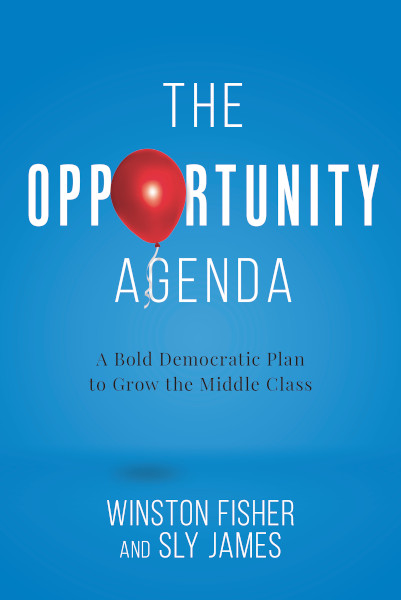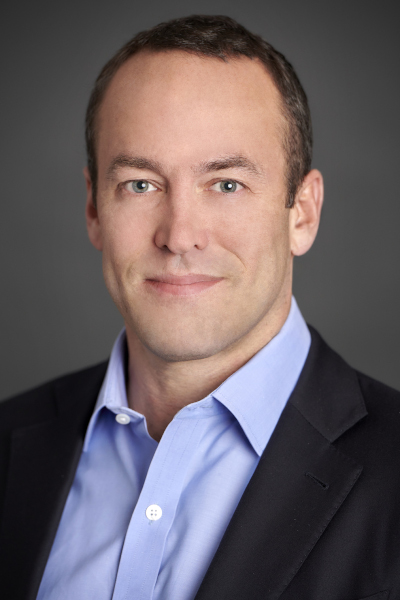A New Path Forward for the Democratic Party

This is an excerpt from The Opportunity Agenda: A Bold Democratic Plan to Grow the Middle Class by Winston Fisher and Sly James (Mascot Books). Printed with permission.
For Democrats, it’s both the worst of times and, by some measure, our most hopeful moment in a decade. We may not control the White House, the Senate, or the Supreme Court for the time being. But the public’s decidedly mixed reaction to President Trump (we’re doing our best to be generous here) combined with a Republican agenda that alienates huge swaths of the electorate, points to a seemingly inevitable Democratic renaissance. If the results of the 2018 midterm elections offer a window into how future contests are likely to turn out, Democrats are poised to bounce back strong.
But our prospects raise two big questions. First, is embracing a message that virulently opposes President Trump’s agenda sufficient to propel us forward even after Trump is no longer on the ballot? Second, even if that is a winning campaign strategy right now, what do we intend to do in office once we’re back in power?
These two questions, while separate, are indelibly intertwined. If the American people react to Donald Trump’s presidency with even a fraction of the disgust and anger the two of us feel, he’s almost sure to be a one-term president. But if we intend to sustain a Democratic governing majority over the long term, we’ll need an agenda (and an accompanying narrative) that stands on its own. Without a compelling message, we won’t be able to hold on to the power that the public’s revulsion to Trump may help us win. Then we’ll be back at square one.
From where we sit, we don’t believe that Democrats have yet begun to grapple in earnest with this quandary. In our zeal to castigate President Trump time and time again, we’ve failed to come to terms with the fact that, in recent elections, our ideas haven’t resonated with vast segments of the American electorate. If more people were invested in our incumbent agenda—if they liked our existing ideas—Trump wouldn’t have been remotely competitive in 2016. We should have trounced the Republicans in the 2016 presidential election.
Don’t get us wrong: We believe Democrats have plenty of good ideas—many of which would surely improve hardworking families’ lives. But we also think that certain elements of our governing philosophy are well past stale. So, in the pages that follow, we’ll introduce a new platform, what we like to call an “Opportunity Agenda” for “Opportunity Democrats.” Our aim is to help steer the Democratic Party back to power in a way that sets us up for long-term success.

Let’s begin by facing the music. Whether or not they represent good policy ideas, there’s nothing “new” in proposals to guarantee Medicare for All, or to raise the minimum wage, or to provide more generous family leave to new parents. The electorate has heard our candidates hawk this stuff for decades. President Trump’s incompetence may be his undoing. But on a substantive level, Democrats today are still selling the same fundamental agenda we had on offer in 2016, even if some of the ideas are a bit more strident.
What are we supposed to do to turn things in a new direction? Admit the truth: We need to refresh our agenda. Some will claim that the 2018 midterms proved that the old stuff is good enough—that we should just stay the course. But that’s simply wrong. Democrats swept control of the House in 2018 primarily because voters were disgusted with President Trump. We didn’t generate the landslide so much as we benefited from the GOP’s implosion. To make a basketball analogy, we didn’t steal the ball or block a shot and run a fast break. We simply caught the rebound.
Not that there’s anything wrong with that—per se. By some measure, that’s how opposition parties always find their way back to power. But Democrats will never make long-term reforms if our success depends on the GOP’s failure. We need an affirmative strategy that establishes a majority, regardless of what the GOP is saying. We need a slate of fresh, new ideas that, on its own, convinces a majority of voters to support our candidates for office. If Democrats are going to get beyond “catching the rebound,” we believe we’ve got to take the party in an entirely different direction.
This book began as a collaborative project between two people who, on paper, appear to have very little in common. One of us is a New Yorker—the other’s from the Midwest. One of us is a businessman, and the other has spent the last decade as a big city mayor. One of us is the spitting image of Denzel Washington—the other is not. And while we’re both young, one is nearly a quarter century older than the other. (We won’t say which.)
For all our differences, we share one central conviction: We believe the Democratic Party is due for a major disruption. It’s not that we think the party should abandon its goals—we still want to help hardworking families achieve the American Dream. But we’re both convinced that, to get our country pointed in the right direction again, Democrats need to rethink our approach.

Here’s our opportunity. Millions of Americans—most Democrats, lots of independents, and even some Republicans—could be convinced to join a broad coalition if someone painted them a compelling picture of the way forward. Unfortunately, after decades of listening to our tired messaging, whole swaths of America have pigeonholed the Democratic Party as so obsessed with growing government that we’ve lost sight of the greater good.
Our stale ideas are particularly inept for economic growth. Two things about the American job market are crystal clear. First, technology and globalization have left many hardworking people feeling exceptionally vulnerable. Breadwinners today hope to maintain the American Dream for the next generation—to ensure their children and grandchildren have it a bit better. But they fear that they’ll hand off a world in which future generations aren’t even able to sustain today’s lifestyle. Remarkably enough, even during periods of low unemployment, many Americans are concerned about the prospect of downward mobility. At the same time, we know that prior to the COVID-19 outbreak, employers struggled to fill open positions—members of the workforce simply don’t have the skills they require. In other words, amid a glut of demand, the workforce still fears being left behind.
Something has gone dreadfully wrong. Even after the economy recovers from the pandemic, it’s likely many people will still fear they won’t have the skills needed for the jobs that emerge.
Have Democrats offered any breakthrough ideas to help equip a vulnerable workforce for the jobs of tomorrow? Not that we’ve heard. Even if we do have good ideas, we’ve failed to message them so voters understand what we want to accomplish. We’re too hung up on our old agenda. We’re too accustomed to preaching the old “big government” gospel.

Does America have the capacity to resolve the mismatch? Unquestionably. If our universities, colleges, and community colleges establish programs to retrain Americans stuck in (soon-to-be) obsolete professions, we could boost millions into higher-paying, more productive jobs. But they aren’t moving fast enough to meet the evolving demands of the country’s businesses. That’s the sort of problem our agenda needs to address head on.
Take one specific illustration: The president of the City University of New York’s (CUNY) LaGuardia Community College recently revealed that she had invested more than two years—thousands of dollars’ worth of staff time—procuring a single piece of software. The purchase had to win approval from one layer of bureaucracy…then the next. From the college’s own faculty. From CUNY. From the State Department of Education. Rather than focus on improving education, they were compelled to navigate a series of bloated bureaucracies.
For Democrats, that anecdote is a political disaster; it burnishes the public’s sense that the very institution we tend to champion— government—is hopelessly inept. Our failure to bear down on this is both a substantive and reputational disaster. Even if Democrats champion education reform, we’re held responsible for nurturing these unwieldy bureaucracies that prevent students from getting the training they need. We need an agenda that demonstrates that we’re going to solve this kind of real-world problem. And we need voters to hear us make that argument time and time again.
Now, Democrats can go on talking about the issues that have long been at the top of their agenda—many have real merit. But the sort of red tape entangling LaGuardia Community College is rampant all across the country. Voters know that America’s “systems” aren’t working for them—higher education, healthcare, infrastructure, or criminal justice. And for many Americans, bureaucratic bungling has a larger impact on life than any single issue that’s made its way into the Democratic bailiwick; it frames their view of government writ large. As a party, we haven’t convinced the public that we’re capable of fixing the underlying problems. We’re not even telling voters that fixing these problems is at the top of our agenda. Is it any wonder they’re not enamored with us?
Red tape isn’t the sole issue holding us back. But we do believe that it’s indicative of a larger problem. The incumbent Democratic agenda fails to address the challenges facing middle- and working-class families from their perspective. We too often endorse government-only solutions when their experience is that the private sector also has a role to play. We need to center our ideas on something else altogether: opportunity. And rather than remain caught in an ideologically driven approach, we need simply to present ideas that will solve the problems that voters grapple with in their everyday lives.

This is an excerpt from The Opportunity Agenda: A Bold Democratic Plan to Grow the Middle Class by Winston Fisher and Sly James (Mascot Books). Printed with permission.
Author Bios:
Sly James is the former mayor of Kansas City, Missouri, and responsible for overseeing the city’s renaissance. Throughout his tenure, James moved the needle on universal pre-K, spearheaded the construction and expansion of a streetcar line, and successfully passed an $800 million infrastructure package. He has also served on numerous boards and commissions, including The Missouri Board of Law Examiners, the Economic Development Corporation, and as president of the Kansas City Metropolitan Bar Association. Mr. James previously authored the critically acclaimed autobiography A Passion For Purpose, a mantra by which he based his tenure as mayor and his life.
Winston C. Fisher is a partner at Fisher Brothers, a real estate firm based in New York City, and CEO of AREA15, an experiential retail and entertainment company. Fisher also serves as co-chair of Gov. Cuomo’s New York City Regional Economic Development Council and is active in civic and policy organizations and higher education institutions, including the Center for an Urban Future, the Real Estate Board of New York, and Syracuse University.
Highbrow Magazine
Image Sources:
--Courtesy of Mascot Books
--Gage Skidmore (Flickr, Creative Commons)
--Gage Skidmore (Wikimedia.org, Creative Commons)































































































































































































































































































































